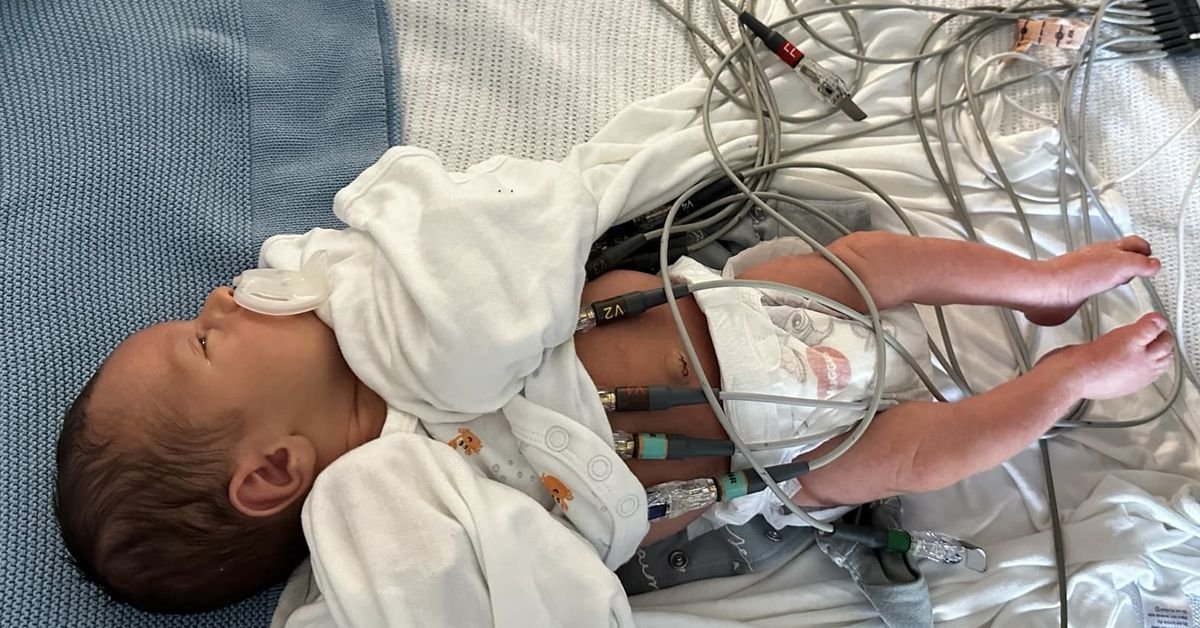Celebrity
Spinal Muscular Atrophy diagnosis: Melitta Taric’s son was days old when diagnosed with a deadly condition, now a pioneering doctor will fly around Australia to save other children like him | Exclusive Interview
Melitta Taric was in the blissful early days of motherhood after welcoming son Axel when she received a life-changing call.
She and husband Benjamin had welcomed their first child on January 23, 2024, at Frankston Hospital in Melbourne. Just over a week later she was safely ensconced at home in her baby bubble when the phone rang.
A newborn bloodspot screening test to look for rare conditions had been carried out when Axel was three days old.
“I remember asking what it was and they said, ‘It’s just a test they send off. No news is good news’ kind of thing. But if something is wrong, you get a call from The Royal Children’s Hospital in Melbourne,” Melitta told 9honey.
READ MORE: Kate speaks of ‘hope and new beginnings’ after cancer diagnosis

On the other end of the phone that day was a genetic counsellor.
“They just told us Axel had tested positive for a neuromuscular disease. They did not say the name of the disease,” she said.
When they arrived at hospital a few days later, they were met by the genetic counsellor and paediatric neurologist Dr Eppie Yiu, who told them Axel had tested positive for spinal muscular atrophy (SMA).
“They told us more about SMA and told us not to Google it. They said they had to do a secondary blood test,” she said.
READ MORE: ‘With one move, it’s clear Prince George is the future of the monarchy’

They returned to hospital a few days later to be told Axel had SMA1 – the most severe form of the rare disease, which affects about one in 10,000 children.
According to Muscular Dystrophy Australia, spinal muscular atrophy (SMA) is a genetic condition affecting the nerves that control muscle movement – the motor neurons, which are located in the spinal cord. As the muscles stop receiving signals, they waste away, reducing movement and then the ability to even swallow or breathe.
Dr Eppie Yiu said it was caused by a missing gene called SMN1. Unbeknown to them, each of Axel’s parents had carried one faulty gene which they passed on to Axel.
Once a baby or child starts to show signs of the condition, it progresses rapidly.
If left untreated, children with SMA1 usually die before they turn two.
But recent medical advancements meant there were several treatments available to Axel, including gene therapy.

Axel was the first baby diagnosed with the condition in Victoria since it was added to that state’s newborn screening program.
Prior to that, children would not be diagnosed until they started to show symptoms – but even modern treatments cannot reverse the damage once it has been done, which can start in utero, so time was of the essence.
“We stayed in hospital that night and they started treatment immediately,” Melitta said.
“It went from zero to hundred straight away. We did not even have time to think.”
His first two treatments were delivered directly to his spinal fluid to keep the condition at bay until the gene therapy could be made in the US and sent to Australia.
“They created this working gene for Axel with his body’s own genetic material,” Melitta said.

“Once it was made they sent it over and it was given to Axel in a drip.”
The highly-specialised treatment saw the gene delivered to Axel’s cells using a virus. The treatment itself took 48 hours.
“With gene therapy we [put] that gene into the body so it can do what it’s supposed to do, and is no longer essentially missing from the body,” Dr Yiu explained.
The couple was warned Axel could become very unwell but he did not suffer any adverse effects. He was discharged after just a few days.

At first, the family returned to hospital up to three times a week for check-ups, then three-monthly and now every six months.
Now 15 months old, Axel is meeting all of his developmental milestones.
A physiotherapy evaluation carried out last week found he was on par with other children his age.
“He is amazing,” Melitta said. “He is walking by himself. He is almost running at this stage.”
But every trip to hospital for a check-up reminds Melitta how lucky they are.

Had it not been for gene therapy, Axel would be nearing the end of his life.
“I am so thankful,” Melitta said, choking back tears.
“We got very very lucky in an unlucky situation.
“We go [back to hospital] for follow-up appointments… and see these kids who were born maybe six months or a year before Axel and it was not picked up with the newborn screening.”.
Melitta said the gene therapy coupled with the newborn screening was now giving children like Axel a “fighting chance at life they never had before”.
“We are so grateful to [Royal Children’s],” she added.

Associate Professor Andrew Kornberg is a senior neurologist Royal Children’s Hospital, Melbourne and a pioneer in treating children like Axel.
He said gene therapy was one type of precision medicine offered at the hospital to treat rare conditions.
“A rare disease is something that occurs in less than one in 2000 people,” Kornberg told 9honey.
“Some rare conditions might be 30 kids in the whole world.
“About one-third of kids with a rare disease will pass away before the age of five.”
Among the worst of these conditions is SMA1.
For a daily dose of 9honey, subscribe to our newsletter here.
“Until about eight years ago, children with SMA1 died before they were two,” Kornberg said.
“Now, with precision medicine, we have gone from complete darkness of children who test positive passing away before they were two to a child like Axel now having a chance of a normal life.”
Kornberg said gene therapy had by all intents and purposes ‘cured’ Axel by providing the missing gene, which was now part of his genetic makeup.
The one-off treatment cost in the vicinity of $3.5 million when you include the therapy itself and Axel’s hospital care in Australia.
Kornberg is now leading a push for a dedicated precinct within the hospital with its own beds and specialised staff to treat patients.
“What we are trying to do is build a precision medicine precinct at the RCH,” Kornberg said.

“If we don’t have dedicated treatment and beds, what can happen in a hospital is if 20 kids come in with influenza or from car accidents… children who need precision medicine will not be treated that day.”
Kornberg, a pilot who flies himself around the country to visit his regional patients, is helping raise the funds by taking to the sky as part of a unique fundraising initiative called Fly for the Kids.
In 2017, Kornberg piloted a small plane 16,000 kilometres in 25 days to raise awareness and funds for children with complex neurological conditions.
“At the time, there was a child who needed a particular treatment that was not available in children,” he said, referring to deep brain stimulation, whereby wires are placed deep in the brain so electrical stimulation can change abnormal signals that cause movement disorders or other brain conditions.
He raised money to establish a Complex Movement Disorders Program at the hospital to treat neurological movement disorders that cause muscle weakness, uncontrollable violent movements, twisting postures and spasms.

Now, he will take to the skies again in July with hopes of raising $4.5 million towards establishing the new precinct.
He was inspired by two of his patients – brothers who suffer from another rare neuromuscular disease, Duchenne muscular dystrophy.
He will circumnavigate Australia, including Tasmania, stopping along the way in regional areas.
“I am going to fly around Australia and will be visiting some of the patients I look after or have looked after, to show the importance of helping these kids,” he said.
“It’s an incredible privilege to be able to do what I can for my patients.
“Every day presents a challenge for so many of these children and their families, and this journey is my way of doing everything I can to bring hope and a brighter future.”
To learn more about Fly for the Kids or make a donation click here.
FOLLOW US ON WHATSAPP HERE: Stay across all the latest in celebrity, lifestyle and opinion via our WhatsApp channel. No comments, no algorithm and nobody can see your private details.
















